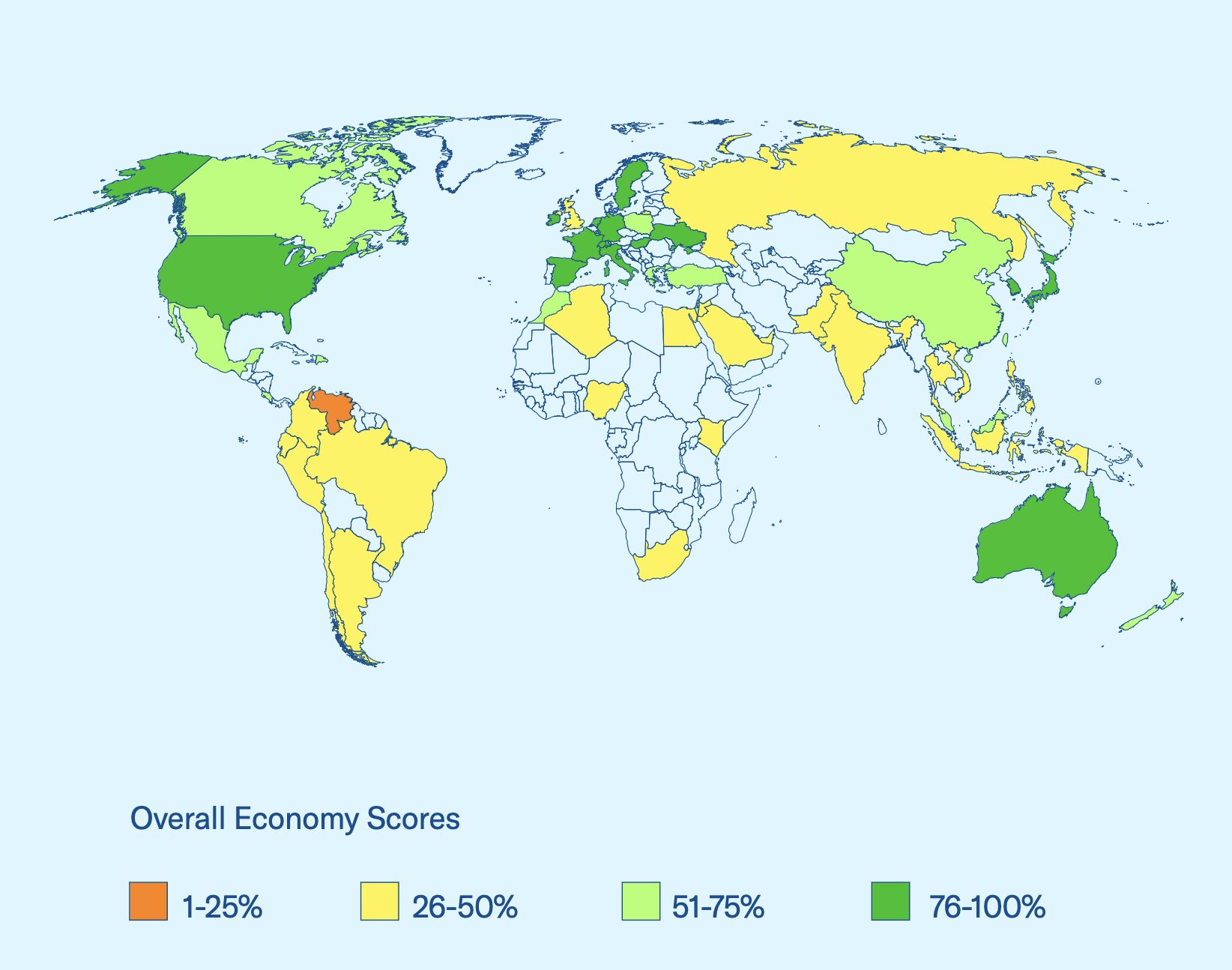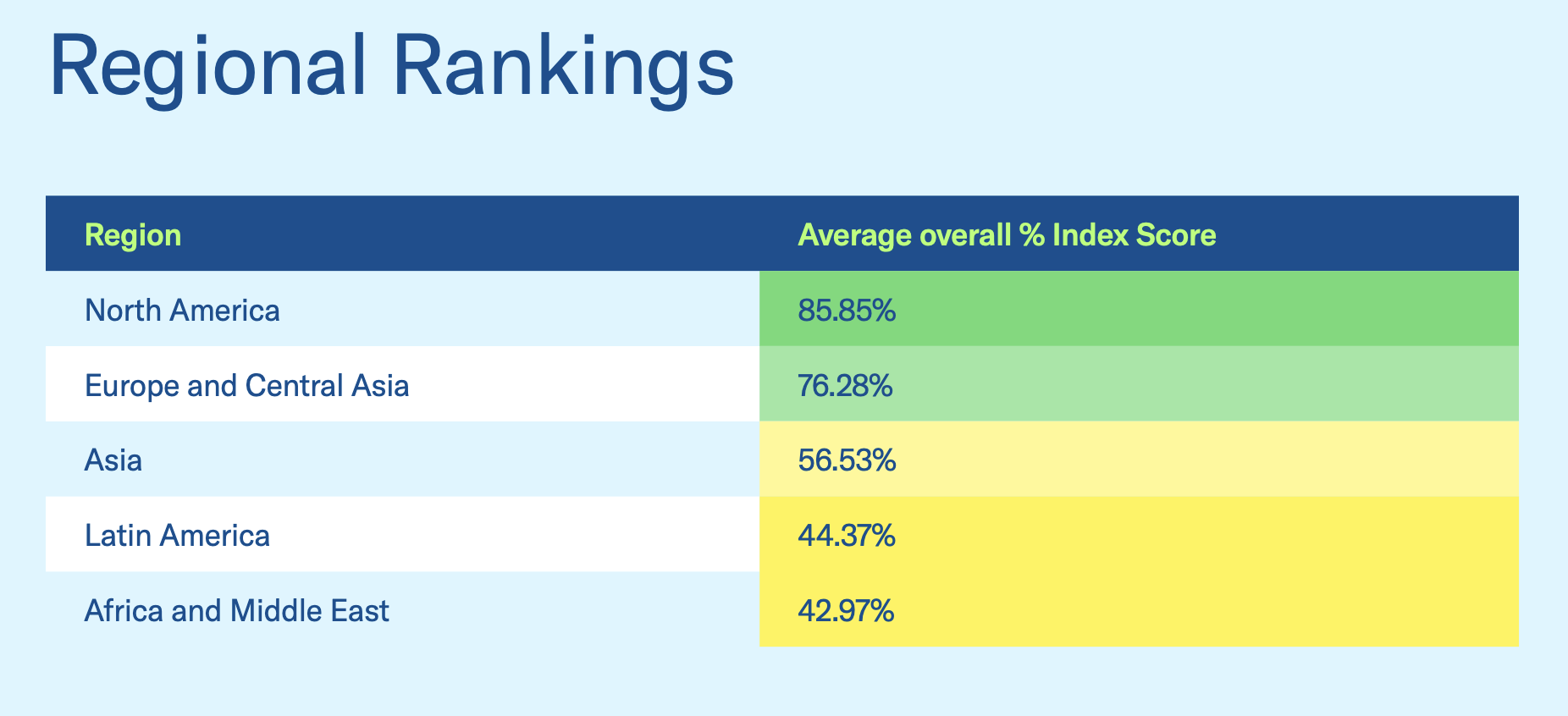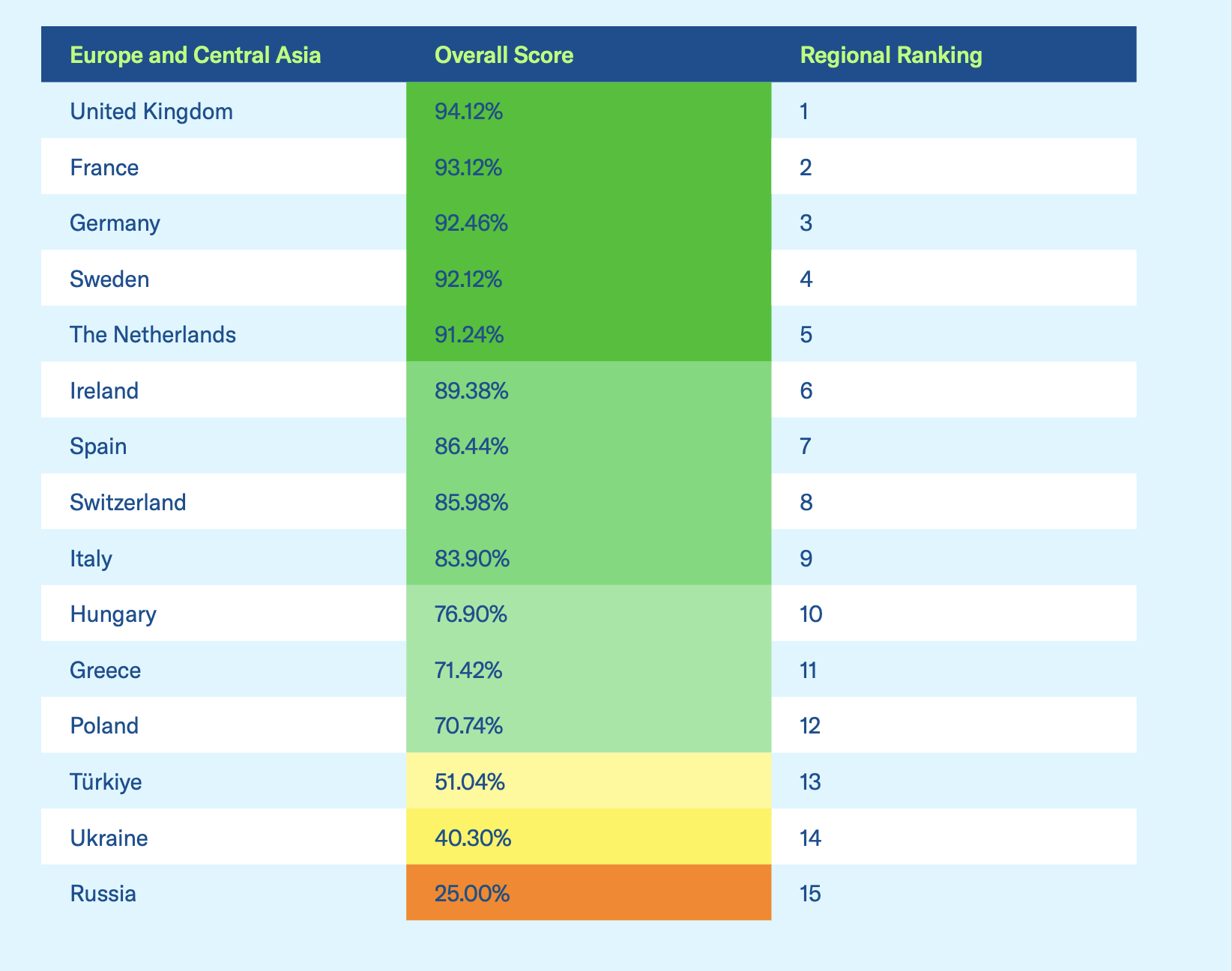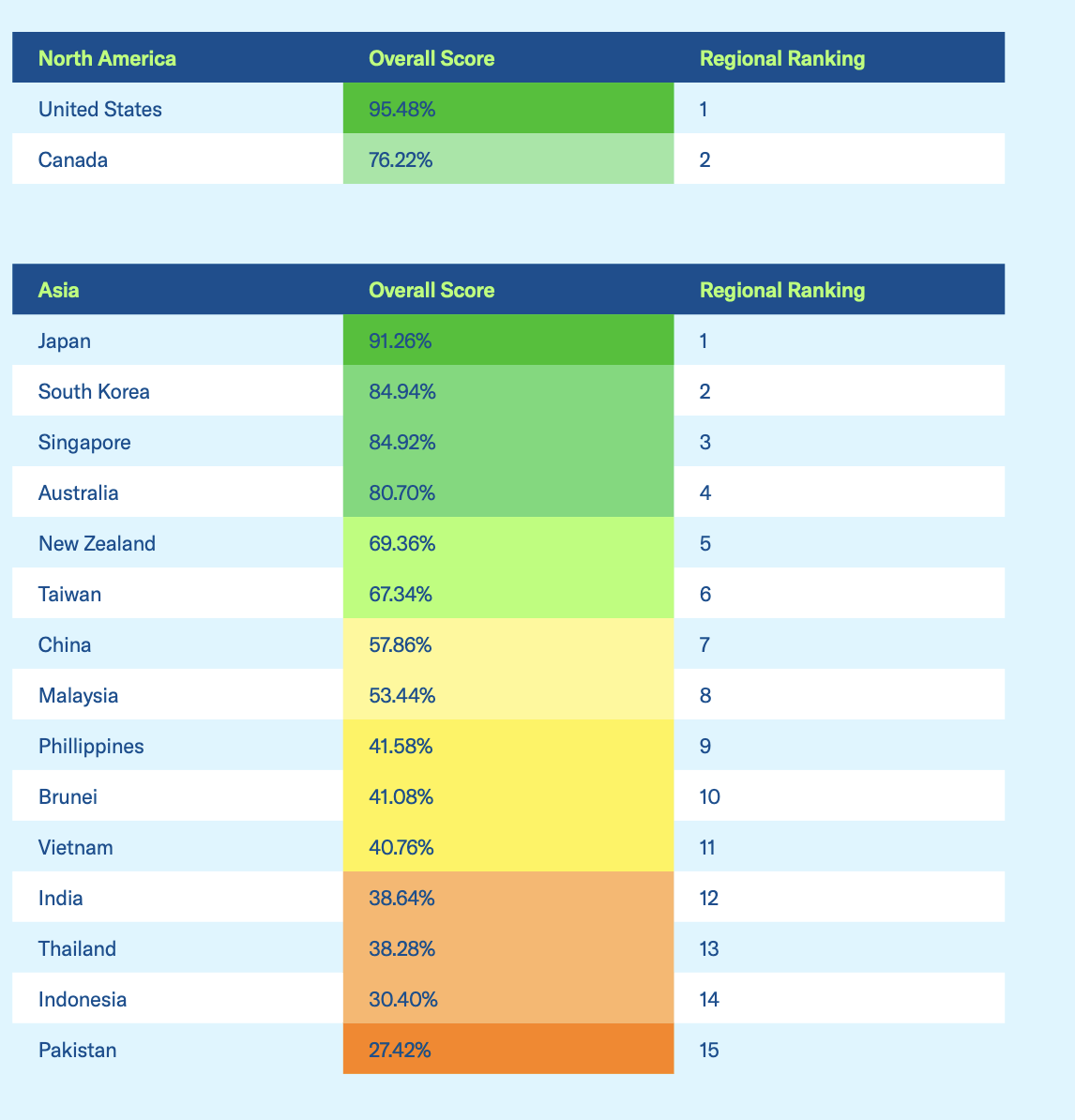“[W]hile it may be the best of times for global innovation, it may also be among the worst of times for rightsholders facing constant infringements and uncertainties across global IP frameworks.”
 On February 22, the U.S. Chamber of Commerce’s Global Innovation Policy Center (GIPC) released the 2024 International IP Index, which provides an annual snapshot of the impact of legal developments in intellectual property (IP) on the innovation ecosystem in dozens of nations across the world. While this 12th version of the GIPC’s index noted some positive developments in national IP frameworks, stagnation among the recurring leaders of the IP Index is a major concern given growing efforts by governments to control prices in critical sectors of the economy, especially in pharmaceuticals.
On February 22, the U.S. Chamber of Commerce’s Global Innovation Policy Center (GIPC) released the 2024 International IP Index, which provides an annual snapshot of the impact of legal developments in intellectual property (IP) on the innovation ecosystem in dozens of nations across the world. While this 12th version of the GIPC’s index noted some positive developments in national IP frameworks, stagnation among the recurring leaders of the IP Index is a major concern given growing efforts by governments to control prices in critical sectors of the economy, especially in pharmaceuticals.
TRIPS Waiver, EU Biopharmaceutical Legislation Among Top Global IP Concerns
Of the 55 national economies included in the 2024 International IP Index, the three countries who saw their IP framework scores improve the most were Saudi Arabia, Brazil and Nigeria. Saudi Arabia gained more than six percentage points in this year’s GIPC index thanks in large part to increased IP enforcement efforts by the Saudi Authority of Intellectual Property (SAIP), which the nation established in 2017 to consolidate its IP departments. IP enforcement campaigns in Brazil and the Nigerian government’s recent enactment of more robust copyright legislation are credited with improving prospects for IP owners in those countries as well.
Across the GIPC’s index, overall scores on IP enforcement frameworks remained the same for 28 nations, while only eight nations saw their scores decrease, and only Ecuador saw a drop of more than one percentage point. However, this year’s International IP Index showed that, among the top 10 nations by index score, only The Netherlands in seventh place improved since last year’s index. That nation’s score increased by more than half a percentage point due in part to increased efforts by Dutch law enforcement in blocking access to illegal content over television set-top boxes. While five nations in the top 10, including the United States, saw their scores stay constant, index scores dropped slightly for the United Kingdom, Sweden, Ireland and Switzerland.
Canvassing international developments impacting overall IP trends, the 2024 International IP Index noted that serious challenges to frameworks for IP rights have been arising within nations that have otherwise been IP leaders. Foremost among these is the evolution of the TRIPS Agreement waiver at the World Trade Organization (WTO) for COVID-19 vaccines and treatments, which would negatively impact the existing IP frameworks that have both enabled global production of vaccines and increased local technical know-how across the world. Specific to European nations, the GIPC’s index also voiced concerns about the European Union’s (EU) proposed biopharmaceutical legislation, which would make it more difficult to extend data exclusivity while also increasing exemptions for follow-on developers to refine health technologies without authorization from the rightsholder.
Longstanding Issues Surrounding Patentability and PTAB Persist in the United States
While the United States again earned the top overall rank on the GIPC’s index, several issues weakening the nation’s IP system remain unaddressed. Key weaknesses for the IP system of the U.S. include long-standing uncertainties regarding subject matter eligibility for patentable inventions in the high-tech sectors. Certainty in U.S. patent rights is further undermined by long-standing issues with validity proceedings at the Patent Trial and Appeal Board (PTAB).



Throughout the index’s executive summary, the GIPC cautioned that the Biden Administration’s recent efforts to exercise march-in rights under the Bayh-Dole Act of 1980 “would in all likelihood lead to the complete destruction of the current life sciences R&D ecosystem, which is built around mutually beneficial public-private partnerships.” The U.S. Chamber of Commerce, the GIPC’s parent organization, has publicly opposed recent calls by U.S. federal agencies to consider product commercialization factors for exercising rights to relicense patented technologies developed in part by federal funding. The index’s survey of IP asset commercialization also noted that government actions in China, Japan and the EU have been creating uncertainties for owners of standard-essential patents (SEPs) that are critical to the coming generation of telecommunication and networking technologies.
While various concerns over the state of global IP frameworks were apparent in this year’s edition of the International IP Index, there were positive developments among global IP leaders identified by GIPC. In the United States, legislative efforts driven by Sens. Chris Coons (D-DE) and Thom Tillis (R-NC) would address many of the patent community’s long-standing concerns over patentability standards and PTAB proceedings. In copyright, the GIPC noted that Brazil and Argentina have joined Canada, India and Singapore in providing dynamic injunctive relief for online infringements. The GIPC further lauded India for enacting criminal sanctions available against those found liable for film piracy.
While many innovation economies are making strides forward, the GIPC concluded that the majority of current legal developments will undercut the business community’s ability to address climate change, future pandemics and other public crises. As the Charles Dickens quote opening the Index’s foreword underscores, while it may be the best of times for global innovation, it may also be among the worst of times for rightsholders facing constant infringements and legal uncertainties across global IP frameworks.
Images Source: International IP Index

![[IPWatchdog Logo]](https://ipwatchdog.com/wp-content/themes/IPWatchdog%20-%202023/assets/images/temp/logo-small@2x.png)

![[Advertisement]](https://ipwatchdog.com/wp-content/uploads/2024/04/UnitedLex-May-2-2024-sidebar-700x500-1.jpg)
![[Advertisement]](https://ipwatchdog.com/wp-content/uploads/2024/04/Artificial-Intelligence-2024-REPLAY-sidebar-700x500-corrected.jpg)
![[Advertisement]](https://ipwatchdog.com/wp-content/uploads/2024/04/Patent-Litigation-Masters-2024-sidebar-700x500-1.jpg)

![[Advertisement]](https://ipwatchdog.com/wp-content/uploads/2021/12/WEBINAR-336-x-280-px.png)
![[Advertisement]](https://ipwatchdog.com/wp-content/uploads/2021/12/2021-Patent-Practice-on-Demand-recorded-Feb-2021-336-x-280.jpg)
![[Advertisement]](https://ipwatchdog.com/wp-content/uploads/2021/12/Ad-4-The-Invent-Patent-System™.png)






Join the Discussion
No comments yet. Add my comment.
Add Comment